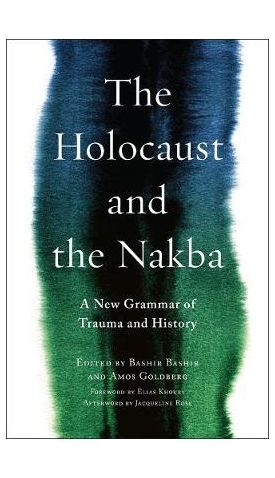אנו משתמשים ב-Cookies כדי לשפר את החוויה שלך. כדי לקיים ההנחיה החדשה של e-Privacy, עלינו לבקש את הסכמתך להגדיר את ה-Cookies. קבלת מידע נוסף.
196.00 ₪
The Holocaust and the Nakba: A New Grammar of Trauma and History
196.00 ₪
ISBN13
9780231182973
יצא לאור ב
New York
עמודים / Pages
424
פורמט
Paperback / softback
תאריך יציאה לאור
13 בנוב׳ 2018
שם סדרה
Religion, Culture, and Public Life
In this groundbreaking book, leading Arab and Jewish intellectuals examine how and why the Holocaust and the Nakba are interlinked without blurring fundamental differences between them. It searches for a new historical and political grammar for relating and narrating their complicated intersections.
In this groundbreaking book, leading Arab and Jewish intellectuals examine how and why the Holocaust and the Nakba are interlinked without blurring fundamental differences between them. While these two foundational tragedies are often discussed separately and in abstraction from the constitutive historical global contexts of nationalism and colonialism, The Holocaust and the Nakba explores the historical, political, and cultural intersections between them. The majority of the contributors argue that these intersections are embedded in cultural imaginations, colonial and asymmetrical power relations, realities, and structures. Focusing on them paves the way for a new political, historical, and moral grammar that enables a joint Arab-Jewish dwelling and supports historical reconciliation in Israel/Palestine.
This book does not seek to draw a parallel or comparison between the Holocaust and Nakba or to merely inaugurate a "dialogue" between them. Instead, it searches for a new historical and political grammar for relating and narrating their complicated intersections. The book features prominent international contributors, including a foreword by Lebanese novelist Elias Khoury on the centrality of the Holocaust and Nakba in the essential struggle of humanity against racism, and an afterword by literary scholar Jacqueline Rose on the challenges and contributions of the linkage between the Holocaust and Nakba for power to shift and a world of justice and equality to be created between the two peoples. The Holocaust and the Nakba is the first extended and collective scholarly treatment in English of these two constitutive traumas together.
| עמודים / Pages | 424 |
|---|---|
| פורמט | Paperback / softback |
| ISBN10 | 023118297X |
| יצא לאור ב | New York |
| תאריך יציאה לאור | 13 בנוב׳ 2018 |
| תוכן עניינים | Foreword: Elias Khoury Introduction: The Holocaust and the Nakba: A New Syntax of History, Memory, and Political Thought, by Bashir Bashir and Amos Goldberg Part I. The Holocaust and the Nakba: Enabling Conditions to a New Historical and Political Syntax 1. Harbingers of Jewish and Palestinian Disasters: European Nation-State Building and Its Toxic Legacies, 1912-1948, by Mark Levene 2. Muslims (Shoah, Nakba), by Gil Anidjar 3. Benjamin, the Holocaust, and the Question of Palestine, by Amnon Raz-Krakotzkin 4. When Yaffa Met (J)Yaffa: Intersections Between the Holocaust and the Nakba in the Shadow of Zionism, by Honaida Ghanim 5. Holocaust/Nakba and the Counterpublic of Memory, by Nadim Khoury Part II. The Holocaust and the Nakba: History and Counterhistory 6. When Genya and Henryk Kowalski Challenged History-Jaffa, 1949: Between the Holocaust and the Nakba, by Alon Confino 7. A Bold Voice Raised Above the Raging Waves: Palestinian Intellectual Najati Sidqi and His Battle with Nazi Doctrine at the Time of World War II, by Mustafa Kabha 8. What Does Exile Look Like? Transformations in the Linkage Between the Shoah and the Nakba, by Yochi Fischer 9. National Narratives of Suffering and Victimhood: Methods and Ethics of Telling the Past as Personal Political History, by Omer Bartov Part III. The Holocaust and the Nakba: The Deployment of Traumatic Signifiers 10. Culture of Memory: The Holocaust and the Nakba Images in the Works of Lea Grundig and Abed Abdi, by Tal Ben-Zvi 11. Ma'abara: Mizrahim Between Shoah and Nakba, by Omri Ben-Yehuda 12. From Revenge to Empathy: Abba Kovner from Jewish Destruction to Palestinian Destruction, by Hannan Hever Part IV. On Elias Khoury's Children of the Ghetto: My Name Is Adam: Narrating the Nakba with the Holocaust 13. Novel as Contrapuntal Reading: Elias Khoury's Children of the Ghetto: My Name is Adam, by Refqa Abu-Remaileh 14. Writing Silence: Reading Khoury's Novel Children of the Ghetto: My Name is Adam, by Raef Zreik 15. Silence on a Sizzling Tin Roof: A Translator's Point of View on Children of the Ghetto, by Yehouda Shenhav Afterword: The Holocaust and the Nakba, by Jacqueline Rose Bibliography Contributors Index |



Login and Registration Form